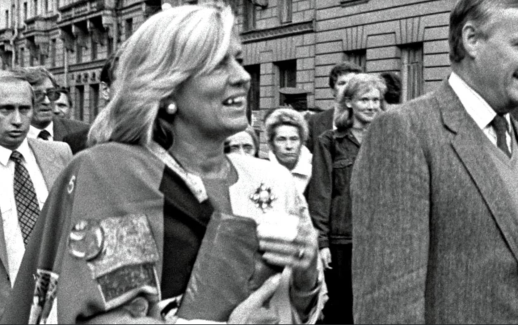China’s diplomatic aid mending Saudi-Iranian relations in the Middle East sees Saudi Arabia immediately offering investment in Iran in the name of Saudi Arabia’s self-interest in regional stability. Yet Saudi Arabia’s investment in Iran would bolster the Iranian regime’s capability to perpetuate repression of its own people, continue as Russia’s chief overt weapons supplier, and prosecute its own arms buildup to remain Israel’s ongoing regional nemesis.
Xi Jinping would entangle Western and Chinese cash flow for cheaply produced Saudi oil with indirectly financing Iran’s support for Putin’s nihilistic aggressions against Ukraine and other states. Beijing seeks western energy-economy cooptation by its Saudi-Iran peace coup, hoping it will weaken U.S. and allied resolve with respect to supporting free nations in the Eastern hemisphere, including Ukraine. Whether or not the U.S. weakens, Beijing and Russia will continue agitating isolationist strife in the United States to try to choke-off independent U.S. and allied free nation trade relationships, access, and control from within the U.S. political system.
In the long game, Beijing would have the U.S. un-economically plunder and consume its domestic resources for a historically short-term surge in felt isolated power as lobbyist-bound Congress and domestic industries fail to invest in future energies, water, tech, and infrastructure. Beijing’s long game would see the U.S. become an isolationist, resource-spent shell of what it once was while the dictators’ club dominates world trade and efficient global and off-planet resource leverage.
The personal power-corruption element in the dictators’ club should not be underestimated. Veiled beneath the positive talk of regional national interest, Saudi Arabia’s Crown Prince Muhammed bin Salman shares with Vladimir Putin, Kim Jong Un, Iran’s theocrats and the Assad regime of Syria a desire to get away with cowing, controlling, and terrorizing free nations into silencing themselves by killing expats residing in Western democracies abroad who live in, speak freely from, and prefer them to the dictatorships they left behind.
Fear buttresses dictators’ murderous interference in the affairs of democracies: fear that their own people will come to desire freedom that the dictators do not intend to share given their statuses above the law, egoism, hubris, and entitlement. They know their people secretly resent their unjust abuses of power. One wonders whether Indian and Turkish leaders Narendra Modi and Recep Tayyip Erdoğan believe they can remain independent from such control, gazing as if into palantírs gifted them by members of the dictators’ club.
Finally, via the Saudi-Iran deal, Beijing and Moscow seek power over OPEC, insuring Beijing’s economic access to more affordable energy and bolstering Moscow’s control over markets tied to its chief economic resource. With such OPEC control, Europe, Nordic nations, the U.K., and Israel are increasingly encircled by a well-funded dictators’ club. Meanwhile, North America, Africa, and South America are increasingly isolated and exploited by the dictators’ club. Also, a viable Russian energy sector remains important for Beijing to exploiting and move Russia’s natural resources to China to work its global agenda.
For the West, this puts a premium on forming new freedom nation organizations of collective action while using the U.N. Convention for the Suppression of Terrorist Bombing to polymutually declare Wagner Group and other autocrat-loyal militant organizations as terrorist groups coercing OPEC and global mining nation governments with the continuous threat of ouster should they step out of line with the dictators’ club. A self-isolating U.S. would reinforce the dictators club policy and could find itself losing trade partners and security allies to Beijing and Moscow.
And for Xi Jinping, arranging an economic support formula for Putin’s aggression against Ukraine not only throws a lifeline to Putin, but it sets a precedent Beijing covets in its claims to Taiwan. For Beijing it is “win-win” whether it succeeds in a peace deal between Kyiv and Moscow or with Putin’s devastation of a fellow slavic neighbor. Xi wishes to keep that precedent as an option for violence against the Chinese people living in Taiwan.
Interesting point: the precedent setting in Ukraine for Taiwan would not matter so much unless it could be a basis for mutual dictatorial U.N. Security Council vetoes of any attempted U.N. action against such aggressions. In this, the U.N. becomes an instrument of tyranny over sovereignty of small nations at the behest of the big dictators’ club. At which point the dictators do what they moralistically condemned the West for having done via colonialism in the past.
Three main free nation joint foreign policy goals will help maintain freedom and hedge against tyranny: (1) to assert free nation treaty action within the U.N. the enforcement of which treaties evades UNSC veto; and (2) to form a competing oil producing nation cartel with OPEC from among free nation producers of oil and gas while continuing to grow and leverage a free-nation oil purchasing cartel recently created; (3) to enhance, replace, or form new international economic blocs of free nations requiring as membership free nation status.
